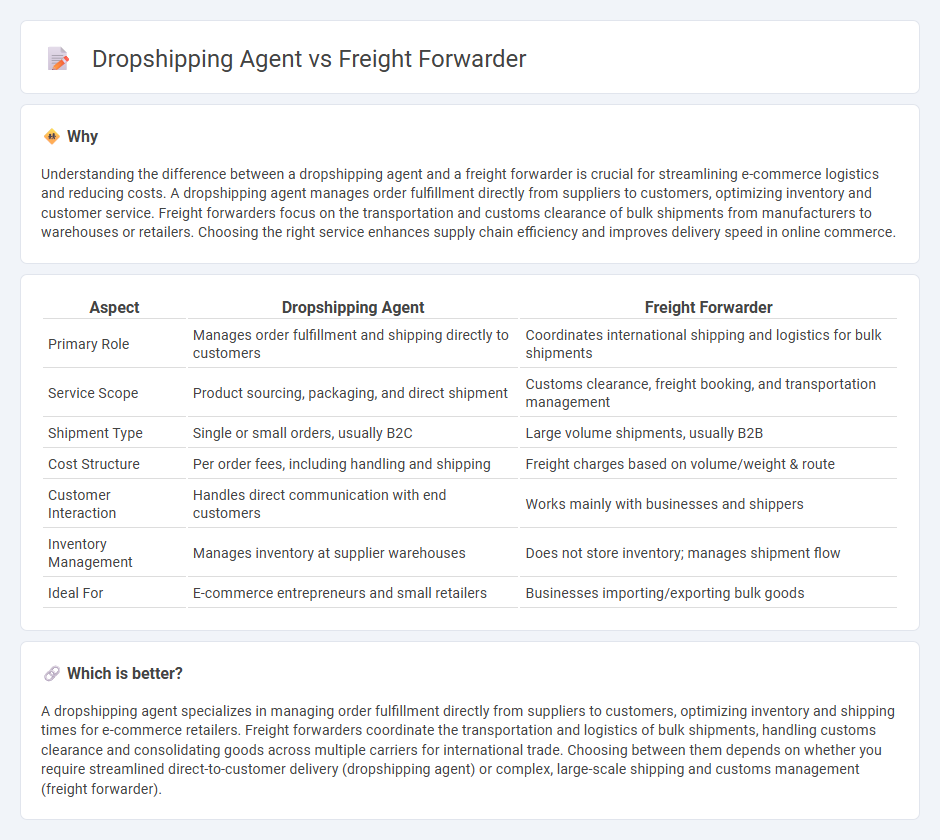
Dropshipping agents specialize in managing product sourcing, order fulfillment, and direct shipment to customers without holding inventory, streamlining e-commerce operations for online retailers. Freight forwarders handle the complex logistics of international shipping, including customs documentation, cargo consolidation, and transportation coordination across multiple carriers. Discover detailed comparisons and insights to choose the right partner for your global commerce needs.
Why it is important
Understanding the difference between a dropshipping agent and a freight forwarder is crucial for streamlining e-commerce logistics and reducing costs. A dropshipping agent manages order fulfillment directly from suppliers to customers, optimizing inventory and customer service. Freight forwarders focus on the transportation and customs clearance of bulk shipments from manufacturers to warehouses or retailers. Choosing the right service enhances supply chain efficiency and improves delivery speed in online commerce.
Comparison Table
| Aspect | Dropshipping Agent | Freight Forwarder |
|---|---|---|
| Primary Role | Manages order fulfillment and shipping directly to customers | Coordinates international shipping and logistics for bulk shipments |
| Service Scope | Product sourcing, packaging, and direct shipment | Customs clearance, freight booking, and transportation management |
| Shipment Type | Single or small orders, usually B2C | Large volume shipments, usually B2B |
| Cost Structure | Per order fees, including handling and shipping | Freight charges based on volume/weight & route |
| Customer Interaction | Handles direct communication with end customers | Works mainly with businesses and shippers |
| Inventory Management | Manages inventory at supplier warehouses | Does not store inventory; manages shipment flow |
| Ideal For | E-commerce entrepreneurs and small retailers | Businesses importing/exporting bulk goods |
Which is better?
A dropshipping agent specializes in managing order fulfillment directly from suppliers to customers, optimizing inventory and shipping times for e-commerce retailers. Freight forwarders coordinate the transportation and logistics of bulk shipments, handling customs clearance and consolidating goods across multiple carriers for international trade. Choosing between them depends on whether you require streamlined direct-to-customer delivery (dropshipping agent) or complex, large-scale shipping and customs management (freight forwarder).
Connection
A dropshipping agent facilitates the sourcing and order fulfillment process by coordinating directly with suppliers, while a freight forwarder manages the logistics of shipping goods from the supplier to the customer. Both entities streamline international trade by handling inventory management and transportation, reducing delivery times and costs. This collaboration ensures efficient end-to-end supply chain operations in e-commerce.
Key Terms
Logistics Coordination
Freight forwarders specialize in managing the entire logistics process, including shipment consolidation, customs clearance, and transportation scheduling across multiple carriers globally. Dropshipping agents primarily coordinate order fulfillment by sourcing products directly from suppliers and arranging timely shipping to end customers, often focusing on streamlined e-commerce operations. Explore detailed comparisons to understand which logistics coordination strategy best suits your supply chain needs.
Inventory Management
Freight forwarders specialize in managing complex logistics and warehousing solutions, ensuring efficient storage, handling, and timely shipment of inventory. Dropshipping agents, in contrast, do not hold inventory but coordinate directly with suppliers to ship products, minimizing storage risks and capital investment. Explore detailed comparisons to understand which service optimizes your inventory management strategy.
Liability Responsibility
Freight forwarders assume liability for the safe and timely transport of goods, often providing insurance and ensuring compliance with customs regulations, while dropshipping agents mainly facilitate order processing and supplier coordination without direct responsibility for shipping or delivery issues. Freight forwarder contracts typically outline clear responsibilities for loss, damage, or delays, contrasting with dropshipping agents whose liability is limited due to their intermediary role. Explore the detailed differences in liability and risk management to choose the optimal solution for your business.
Source and External Links
Freight Forwarder Services: A Global Directory of Logistics Providers - Freight forwarders are companies that facilitate the sale and shipment of raw materials and finished goods overseas by arranging transport, handling paperwork, and complying with export-import regulations, often specializing in various types of cargo and shipping needs.
Freight Forwarders: A Comprehensive Guide, Updated For 2025 - A freight forwarder is a firm that arranges cargo shipments on behalf of shippers, providing services like ocean/air freight, inland transport, documentation, warehousing, and customs compliance, effectively managing the import and export logistics chain.
Freight Forwarder | CEVA Logistics - The freight forwarder manages the logistics and organizational aspects of goods transport, deciding on transit solutions to ensure efficient and economical delivery, often working under regulation and professional certification requirements.
 dowidth.com
dowidth.com